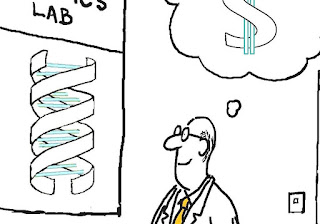
#Pathology vs myriad genetics series#
cDNA, in other words, can be patented, according to the Court, because it is a man-made copy of the genetic messenger messenger in the cell.Judges and patent office officials on both sides of the Atlantic have decided a series of high-profile gene-related disputes. The Supreme Court ruled unanimously last month that naturally occurring genes cannot be patented. What it means is that you can sue someone and seek patent protection for their research and genetic testing. What Court Ruling Made Dna Patentable?Īccording to a recent Supreme Court decision, cDNA must be used. It is a decision affirming that human genes are not property, which opens the door for more genetic information to be freely shared among scientists and doctors, and it will limit companies from profiting unfairly from our biological vulnerabilities. Natural human genes, according to today’s Supreme Court decision, cannot be patented because they are products of nature, which means they cannot be patented as human inventions. Scientists and doctors can freely share more genetic information as a result of the decision, which will also protect companies from profiting unfairly from human vulnerability. Human genes cannot be patented because they are not property, according to the ruling issued today. Because similarity does not necessarily imply a current client, partnership, or employee, it is impossible to make any assumptions about the client, partnership, or employee. We do not make any representations or warranties about the operation or content of the site, whether express or implied. It is not a guarantee that the information on this blog is complete, accurate, or up-to-date however, it is posted AS IS. Innovative methods of manipulating genes are just one example of new genetic discoveries that can lead to patent protection. This decision may have a knock-on effect, potentially invalidating granted patents and making it more difficult to obtain patents protecting natural products. Supreme Court ruled that certain isolated genes and the information they contain are ineligible for patent protection under section 101 of the Patent Act. In the case of the BRCA1 and bRCA2 genes, Myriad had the ability to seek patent protection for any innovative method of manipulating genes. cDNA fragments that appear to be identical to natural DNA are not permitted by law, according to the court. cDNA, according to the Supreme Court, is patent eligible because it is an exons-only molecule that is not produced naturally. Instead of a corollary, the court seemed to be requesting a new composition of matter without one. In a case decided by the United States Supreme Court, the Court ruled that separating a gene from its surrounding genetic material is not a method of invention. The Supreme Court has ruled that Myriad Genetics cannot patent isolated BRCA1 and 2 genes in chromosomes 17 and 13 on the grounds that they are patent eligible. cDNA can be patented because it is not naturally occurring, according to a unanimous opinion authored by Justice Thomas.

The Supreme Court issued a long-awaited decision in the Association For Molecular Pathology v. Myriad Genetics had claimed patent infringement against the BRCA1 and BRCA2 genes in the ruling. Supreme Court issued a unanimous ruling in favor of 20 medical organizations, geneticists, women’s health groups, and patients in a case brought by the American Civil Liberties Union. What Did The Supreme Court Rule In The Myriad Genetics Case? It may have been used to sabotage scientific progress and health care efforts, such as preventing BRCA1 and 2 gene testing and assisting patients who require assistance. Myriad would have owned the genes for most practical purposes and applications if the patents had been valid and comprehensive. In addition to its claims of exclusivity, Myriad was accused of a variety of other problems. Myriad claimed to have exclusive rights to certain tests and other genetic materials related to the genes under review. The company discovered a novel discovery in 1994 that increases the risk of cancer by two genes. Myriad Genetics is a genomic research company that seeks to understand the function of various sequences of DNA in the human genome. The case has been described as “one of the most important cases concerning patent law and the life sciences.”

Molecular Pathology vs Myriad Genetics was a landmark case in which the Supreme Court of the United States held that a naturally occurring DNA segment is a product of nature and not patentable subject matter.


 0 kommentar(er)
0 kommentar(er)
